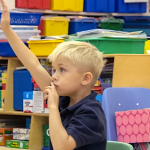The Apathy Is Gonna Kill Us
 You are in a jungle. You are being chased by a hungry lion. You have two choices, right? Stay and fight or run like the wind. Fight or flight is one of our most basic survival instincts in response to stress, but these aren’t the only two choices. Freeze is another. Fight, flight or freeze. There are animals whose defense mechanism is to play dead, and during this pandemic, many kids and teens are channelling their inner opossum. It is important to recognize that just because our kids aren’t running away from home or lashing out at their teachers, doesn’t mean they aren’t experiencing potentially harmful effects from stress.
You are in a jungle. You are being chased by a hungry lion. You have two choices, right? Stay and fight or run like the wind. Fight or flight is one of our most basic survival instincts in response to stress, but these aren’t the only two choices. Freeze is another. Fight, flight or freeze. There are animals whose defense mechanism is to play dead, and during this pandemic, many kids and teens are channelling their inner opossum. It is important to recognize that just because our kids aren’t running away from home or lashing out at their teachers, doesn’t mean they aren’t experiencing potentially harmful effects from stress.
One of the hardest things for me to watch through all of this hasn’t been on the news or on social media, it’s been in the rooms of my high schoolers. While I try to motivate them to leave their beds, get up and move around, and change their locations for different classes, midmorning often finds them taking a little nap. Midafternoon often finds them taking another little snooze. Naps are occurring either in between “classes” or during one, because there is no requirement to be online. Not surprisingly, they comment on how tired they are every day. An object at rest tends to stay at rest. This is heartbreaking. Kids should be at school. They should be with friends. They should not be hunkered down, isolated in their bedrooms, and even if it is for the greater good, it is still dangerous to their wellbeing. We are asking them to fight every natural human instinct at home and in college. They are being deprived of the opportunity to grow and develop socially, not to mention the gaps in their academic progress. Long-term virtual learning carries risk. It is not for me to say whether these risks will have been worth it for controlling the pandemic. History will shine light on that issue at some point, and I hope it does not judge us too harshly for the burden we’ve required our youngest generations to carry. Of course, they’ll be the ones struggling with the economic ramifications for years to come. I can only hope the mental health effects aren’t too great.
Your child may appear to be doing fine. They may not be complaining. They may even seem content with their hibernation. And, if you are lucky, maybe they are truly ok. For many introverts, this has been a soothing time. I hear a lot of adults saying they’d prefer things not to go back to the normal we knew before. This slow pace and working from home is right up their alley. I hope they take the lessons this year has taught, remember how they felt under forced quarantine and voluntarily incorporate more downtime into their life. Some kids who suffer with anxiety are feeling calmer without external pressures, and this is easy to understand. Other kids are struggling now, or will face some serious struggles upon reentry. As parents, who are dealing with our own demons, it is critical we aren’t lulled into a false sense of security by our kids contentment. Apathy is as much a defense mechanism against crippling stress as is anger or anxiety. Apathy, I fear, will be even more difficult to reverse when (Dear Lord, let it be soon) life as we knew it resumes.
How do you help your child fight apathy and lack of motivation?
1. Talk to them about how they are managing in times of calm … not when you are looking at a parent portal or telling them to get up and clean their room.
2. Listen. Ask questions and listen to the answers. Don’t ask like an interview, just get curious. Put your phones down and look them in the eye. If you need some suggestions about how to get started, here are some ideas.
- What’s been the hardest thing about this year? Why?
- What’s been the best thing about this year? Why?
- What is the best and worst thing about each day? Why?
- What do you wish I understood about you?
- What do you wish your teachers understood about you?
- How do you think you are managing being home so much?
- How are you sleeping?
- If you had to use three adjectives to describe your relationship with ______ (school, friends, me, life, social media, etc.) what would they be?
- What do you think would motivate you to _______ (move more, do better in school, sleep better, eat better, etc.)
- How would you advise a friend who said she felt unmotivated and wanted to change?
- What are you fearful of? What do you trust?
- In a perfect world, what would you change right now?
3. Don’t judge. There are no wrong answers, and your children need to believe this. While I know there is a knee-jerk reaction to tell your kids people have it worse, you will just be adding guilt to their pain. Perspective is good. Guilt isn’t. Remember that this year is a bigger percentage of their lives than it is of yours, and there is uncertainty about when it will end. Your 13 year old likely doesn’t remember the first 3 years of her life, so 10% of her life has been spent in some version of a lockdown. That would be about 4 or 5 years for you. To think this won’t emotionally stunt many kids is a fantasy.
4. Lead by example. Talk about yourself, how you are feeling with all this isolation, how you are coping with it and what your intentions are to feel better and more healthy in mind and body. Keep healthy foods and a healthy attitude readily available.
5. Goal setting. Having a clear eye on the future is important. Talk about all the long term things they have to look forward to and the steps it will take for them to reach these — and their short-term — goals. Help them set attainable metrics along the path to whatever it is they want to accomplish. When they slide backward, gently pull them back up by reminding them their goals are worth working toward.
6. Talk about things you will all do in the future, and paint vivid images so your kids know this is not the norm, and it will change.
7. Save your fear-filled conversations for adults only. Around your kids, be confident about the future. Their security in knowing this will someday end will inspire confidence and action.
Just as you cannot fight or outrun the lion forever, you also can’t play dead forever. Believe me, I know all too well how much easier it is to let sleeping dogs lie, but apathy requires your intervention as much as anxiety or anger. While you shouldn’t drag your child out of bed kicking and screaming, you should nudge them in a direction of productivity, joyfulness and self-motivation. Let’s get these feet on the ground!
10 Tip for Better Sex During the Pandemic

Eating to Boost Your Immune System

50+ of Our Favorite Family Games
























